Ditapis dengan
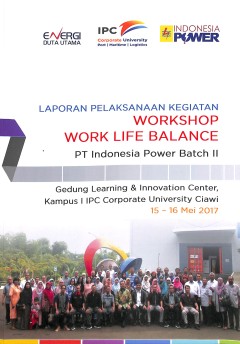
Laporan pelaksanaan pelatihan kegiatan workshop work life balance PT Indonesi…
- Edisi
- -
- ISBN/ISSN
- -
- Deskripsi Fisik
- iv, 16 p.; 30 cm
- Judul Seri
- -
- No. Panggil
- IPC REP 2017 WOR w
- Edisi
- -
- ISBN/ISSN
- -
- Deskripsi Fisik
- iv, 16 p.; 30 cm
- Judul Seri
- -
- No. Panggil
- IPC REP 2017 WOR w
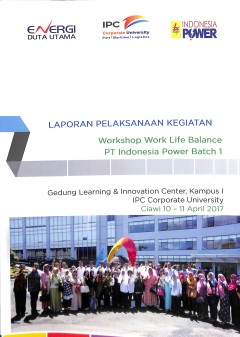
Laporan pelaksaan kegiatan workshop work life balance PT Indonesia Power Batc…
- Edisi
- -
- ISBN/ISSN
- -
- Deskripsi Fisik
- iv, 21p.; 29 cm
- Judul Seri
- -
- No. Panggil
- IPC REP 2017 WOR w
- Edisi
- -
- ISBN/ISSN
- -
- Deskripsi Fisik
- iv, 21p.; 29 cm
- Judul Seri
- -
- No. Panggil
- IPC REP 2017 WOR w

Stability and competition in intermodal container shipping: finding a balance
This article considers thc perennial topic of how to achieve an equilibrium balance between stability and competition in intermodal shipping. It argues that competition is becoming destructive, but that the imbalance is difficult to correct in a climate where competitive pressures are strong everywhere and restraints on competition are unfashionable. In this context, pricing of intermodal servi…
- Edisi
- 1998. VOL 25, NO 2, 129 147
- ISBN/ISSN
- -
- Deskripsi Fisik
- 21 p.
- Judul Seri
- Maritime Policy & Management: The flagship journal of international shipping and port research
- No. Panggil
- ATC LO GRA s
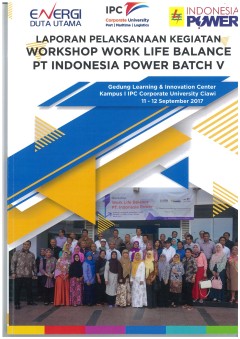
Laporan pelaksanaan kegiatan workshop work life balance PT Indonesia power ba…
- Edisi
- 11-12 September 2017
- ISBN/ISSN
- -
- Deskripsi Fisik
- 23 p.
- Judul Seri
- -
- No. Panggil
- IPC REP 2017 IND w
- Edisi
- 11-12 September 2017
- ISBN/ISSN
- -
- Deskripsi Fisik
- 23 p.
- Judul Seri
- -
- No. Panggil
- IPC REP 2017 IND w

Balanced Scorecard – a strategic management system of the higher education…
- Edisi
- Vol. 29 Iss 2 pp. 167 - 176
- ISBN/ISSN
- 0951-354X
- Deskripsi Fisik
- 11 p.
- Judul Seri
- -
- No. Panggil
- ATC MG HLA b
- Edisi
- Vol. 29 Iss 2 pp. 167 - 176
- ISBN/ISSN
- 0951-354X
- Deskripsi Fisik
- 11 p.
- Judul Seri
- -
- No. Panggil
- ATC MG HLA b
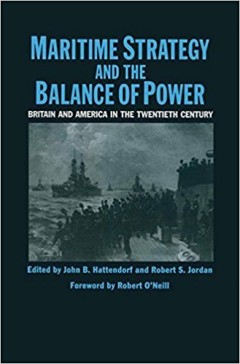
Maritime strategy and the balance of power : Britain and America in the twent…
- Edisi
- -
- ISBN/ISSN
- 978-1-349-09392-2
- Deskripsi Fisik
- xx, 273p.
- Judul Seri
- -
- No. Panggil
- TXT MR JOR m
- Edisi
- -
- ISBN/ISSN
- 978-1-349-09392-2
- Deskripsi Fisik
- xx, 273p.
- Judul Seri
- -
- No. Panggil
- TXT MR JOR m
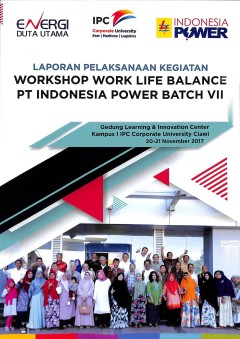
Laporan pelaksanaan kegiatan : Workshop Work Life Balance PT Indonesia Power…
- Edisi
- 20 - 21 November 2017
- ISBN/ISSN
- -
- Deskripsi Fisik
- 19 p., + atc., 21 cm.
- Judul Seri
- Batch VII
- No. Panggil
- IPC REP 2017 WOR w
- Edisi
- 20 - 21 November 2017
- ISBN/ISSN
- -
- Deskripsi Fisik
- 19 p., + atc., 21 cm.
- Judul Seri
- Batch VII
- No. Panggil
- IPC REP 2017 WOR w

A multi-stage analysis of antecedents and consequences of knowledge managemen…
Drawing from knowledge-based view and balanced scorecard approach, this study seeks to develop an integrative model to examine the influence of two knowledge management (KM) strategies, codification KM strategy and personalization KM strategy, on the multi-stage KM evolution (KM adoption, implementation and institutionalization stages), which in turn affects balanced scorecard outcomes (financi…
- Edisi
- VOL. 18 NO. 1 2014, pp. 52-74
- ISBN/ISSN
- 1367-3270
- Deskripsi Fisik
- 25 p.
- Judul Seri
- Journal of Knowledge Management
- No. Panggil
- ATC MG LIN a

An empirical test of the balanced theory of port competitiveness
The theory was shown to explain the behavior of port stakeholders in improving competitiveness by balancing the need to attract new customers with that of attracting new investors when making decisions, which can often be contradictory. The analysis showed significant effects for the 5 variables of Volume Competitiveness and the 5 variables of Investment Competitiveness.
- Edisi
- Vol. 28 Issue 2
- ISBN/ISSN
- -
- Deskripsi Fisik
- 29 p.
- Judul Seri
- -
- No. Panggil
- ATC PO HAL a

Performance measurement in supply chain entities: balanced scorecard perspective
The purpose of this paper is to empirically examine what senior supply chain executives measure and how they perceive performance measurement from a balanced scorecard (BSC) perspective.
- Edisi
- Vol. 16 No. 5, 2009
- ISBN/ISSN
- -
- Deskripsi Fisik
- 19 p.
- Judul Seri
- Benchmarking: An International Journal
- No. Panggil
- ATC LO HOO p

Logistics network optimization considering balanced allocation and vehicle ro…
This article presents an effort to study the complex problem that arises when balanced allocation is integrated with vehicle routing decisions in a logistics network. This integrated problem is frequently encountered in many logistics networks that maximize the efficiency and effectiveness of available warehouses and distribution centers. After modeling the balanced allocation vehicle routing p…
- Edisi
- Vol. 18, 1, 41–60
- ISBN/ISSN
- -
- Deskripsi Fisik
- 20 p.
- Judul Seri
- Maritime Economics & Logistics
- No. Panggil
- ATC LO GEN l
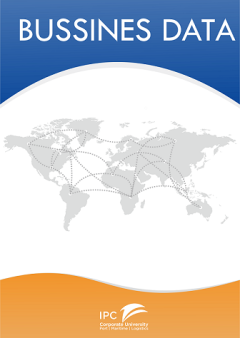
Economic analysis - imports t o pick up over coming quarters
Indonesia recorded a trade surplus of USD4.4bn in H115, following a larger dip in imports relative to exports. The slowdown in import volume growth could be an indicator of sluggish growth in the industrial sector. However, as government-backed infrastructure projects enter the construction phase over the coming quarters, imports should start to pick up, and we expect the trade surplus to narro…
- Edisi
- -
- ISBN/ISSN
- -
- Deskripsi Fisik
- 2 p.
- Judul Seri
- -
- No. Panggil
- BD BMI e

Economic analysis - import contraction suggests sluggish growth
Indonesia's current account balance will benefit from its widening trade surplus, which should allow the deficit to narrow to 2.4% and 1.8% of GDP in 2015 and 2016, respectively. However, as the trade surplus has largely been the result of a deeper contraction in imports relative to exports, it reflects poor investor appetite and sluggish industrial activity, which will weigh on economic growth.
- Edisi
- -
- ISBN/ISSN
- -
- Deskripsi Fisik
- 2 p.
- Judul Seri
- -
- No. Panggil
- BD BMI e
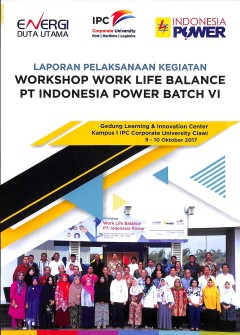
Laporan pelaksanaan kegiatan Workshop Work Life Balance PT Indonesia Power Ba…
- Edisi
- -
- ISBN/ISSN
- -
- Deskripsi Fisik
- 19 p., + lampiran 29 cm
- Judul Seri
- -
- No. Panggil
- IPC REP 2017 WOR w
- Edisi
- -
- ISBN/ISSN
- -
- Deskripsi Fisik
- 19 p., + lampiran 29 cm
- Judul Seri
- -
- No. Panggil
- IPC REP 2017 WOR w

Financial statement analysis of logistics service providers: ways of enhancin…
Despite the relevance of financial information relating to logistics service providers (LSPs), recent research has paid little attention to the financial analysis of LSPs. The aim of this paper is to examine the balance sheet structure of LSPs in order to find out if there are differences between single providers or defined LSP groups (clusters), respectively. Furthermore, the dependency of ass…
- Edisi
- Vol. 43 No. 4, 2013 pp. 321-342
- ISBN/ISSN
- -
- Deskripsi Fisik
- 25 p.
- Judul Seri
- International Journal of Physical Distribution & Logistics Management
- No. Panggil
- ATC LO HOF f

Development of a balanced scorecard for flight line maintenance activities
The purpose of this paper is to describe the development of a balanced scorecard (BSC) for flight line maintenance (MX) activities in the US Air Force .
- Edisi
- Vol. 21 No. 4, 2015 pp. 436-455
- ISBN/ISSN
- -
- Deskripsi Fisik
- 22 p.
- Judul Seri
- Journal of Quality in Maintenance Engineering
- No. Panggil
- ATC LO TON d
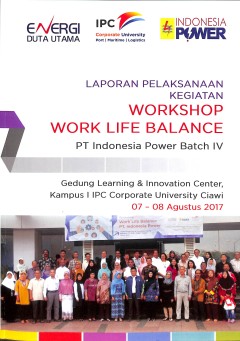
Laporan pelaksanaan kegiatan workshop work life balance : PT Indonsia II Powe…
- Edisi
- -
- ISBN/ISSN
- -
- Deskripsi Fisik
- 19 p., + lampiran 29 cm
- Judul Seri
- -
- No. Panggil
- IPC REP 2017 WOR w
- Edisi
- -
- ISBN/ISSN
- -
- Deskripsi Fisik
- 19 p., + lampiran 29 cm
- Judul Seri
- -
- No. Panggil
- IPC REP 2017 WOR w
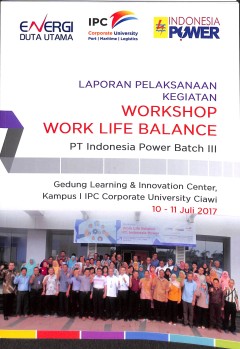
Laporan pelaksanaan kegiatan workshop life balance : PT Indonsia Power Batch …
- Edisi
- -
- ISBN/ISSN
- -
- Deskripsi Fisik
- 19 p., + lampiran 29 cm
- Judul Seri
- -
- No. Panggil
- IPC REP 2017 WOR w
- Edisi
- -
- ISBN/ISSN
- -
- Deskripsi Fisik
- 19 p., + lampiran 29 cm
- Judul Seri
- -
- No. Panggil
- IPC REP 2017 WOR w

Logistics performance management in action within a humanitarian organization
The purpose of this paper is to share the design and testing procedure of the ‘‘Development Indicator Tool’’ – a tool developed by the International Federation of Red Cross and Red Crescent Societies (IFRC) to guide and monitor the continuous performance improvement of their (regional) logistics unit(s) on a daily basis.
- Edisi
- -
- ISBN/ISSN
- -
- Deskripsi Fisik
- 15 p.
- Judul Seri
- Management Research News
- No. Panggil
- ATC LO SCH l
 Karya Umum
Karya Umum  Filsafat
Filsafat  Agama
Agama  Ilmu-ilmu Sosial
Ilmu-ilmu Sosial  Bahasa
Bahasa  Ilmu-ilmu Murni
Ilmu-ilmu Murni  Ilmu-ilmu Terapan
Ilmu-ilmu Terapan  Kesenian, Hiburan, dan Olahraga
Kesenian, Hiburan, dan Olahraga  Kesusastraan
Kesusastraan  Geografi dan Sejarah
Geografi dan Sejarah